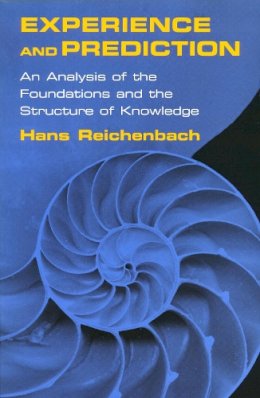
Stock image for illustration purposes only - book cover, edition or condition may vary.
Experience and Prediction: An Analysis of the Foundations and the Structure of Knowledge
Hans Reichenbach
FREE Delivery in Ireland
Description for Experience and Prediction: An Analysis of the Foundations and the Structure of Knowledge
Paperback. Hans Reichenbach was a formidable figure in early-twentieth-century philosophy of science. In the two decades following World War II, logical positivism was the reigning theory of the philosophy of science and Reichenbach was at the peak of his career. He wrote this book to introduce logical positivism to English speakers. Num Pages: 464 pages, illustrations. BIC Classification: HPCF; PDA. Category: (P) Professional & Vocational; (UP) Postgraduate, Research & Scholarly; (UU) Undergraduate. Dimension: 212 x 184 x 33. Weight in Grams: 590.
Hans Reichenbach (1891–1953) was a formidable figure in early-twentieth-century philosophy of science. Educated in Germany, he was influential in establishing the so-called Berlin Circle, a companion group to the Vienna Circle founded by his colleague Rudolph Carnap. The movement they founded—usually known as "logical positivism," although it is more precisely known as "scientific philosophy" or "logical empiricism"—was a form of epistemology that privileged scientific over metaphysical truths. Reichenbach, like other young philosophers of the exact sciences of his generation, was deeply impressed by the far-reaching changes in physics brought about by Einstein's special and general theories of relativity. Reichenbach responded ... Read moreto scientific advances by doing fundamental work in space-time theories, in quantum mechanics, in statistical mechanics, and in the development of probability theory—making him the most important philosopher of physics in the first generation of logical empiricism.
Forced from his academic position by the Nazi race laws in 1933, Reichenbach wrote Experience and Prediction at the University of Istanbul, where had had fled, expressly to introduce logical positivism to English speakers. In the two decades following World War II, during the explosion of scientific advances in North America, logical positivism was the reigning theory of the philosophy of science and Reichenbach was at the peak of his career. But, inevitably, support for logical positivism began to wane as it became obvious that the justification of scientific theories could not be entirely resolved by relying on strictly formal, technical processes.
The growth of the discipline of the history of philosophy of science, which has created an audience of scholars eager for seminal classics in scientific philosophy, and the evidence supporting a historicist paradigm within logical positivism are two important reasons to make Experience and Prediction available once again.
Show Less
Product Details
Publisher
University of Notre Dame Press
Place of Publication
Notre Dame IN, United States
Shipping Time
Usually ships in 7 to 11 working days
About Hans Reichenbach
Alan W. Richardson is professor of philosophy at the University of British Columbia.
Reviews for Experience and Prediction: An Analysis of the Foundations and the Structure of Knowledge
"Experience and Prediction reprints the classic treatise by German-American philosopher of science Hans Reichenbach (1891-1953). . . Experience and Prediction breaks down the fundamental conundrums of existence, reduction, projection, construction, the nature of the ego, probability logic, and much more." —Wisconsin Bookwatch "Hans Reichenbach's Experience and Prediction is one of the most important books in twentieth-century philosophy of science. Its ... Read moreauthor was, along with Rudolf Carnap, one of the two principal ambassadors to North America of the exciting new European philosophical movement known here under the names 'Logical Positivism' and 'Scientific Philosophy.' In 1938, when the book was published, Reichenbach was an exile from his native Germany, teaching in Istanbul, Turkey, and about to emigrate to the United States to take up a prestigious position at UCLA. He wrote Experience and Prediction in English as his calling card to his new American colleagues. More than any other single book, Experience and Prediction set the agenda for the new discipline of the philosophy of science that was to emerge after World War II as, perhaps, the most exciting new area in North American philosophy. Many of the problems still at the focus of discussion were given their classic formulations in this book. Long out of print, Experience and Prediction appears here in a new edition accompanied by a splendid historical introduction by the noted young philosopher and historian of the philosophy of science, Alan Richardson. A jewel of a book may once again be appreciated in its proper setting." —Don A. Howard, University of Notre Dame “. . . reprints the classic treatise by German-American philosopher of science Hans Reichenbach (1891-1953). . . Experience and Prediction breaks down the fundamental conundrums of existence, reduction, projection, construction, the nature of the ego, probability logic, and much more.” —Midwest Book Review Show Less

